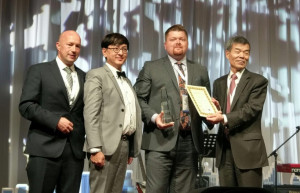
Mikaela Revel, Marketing Manager of TT Club presents the Seahorse Newcomer of the Year Award to Sophie Barnes of Heavy Lift and Project Forwarding International
London, 15th December, 2017
TT Club, International insurance provider to the freight transport and cargo handling industries, has been an enthusiastic supporter of the Seahorse Club Journalist Awards for some years. The Awards are specifically for media professionals active in the maritime, air cargo and logistics arena. At the 2017 Awards Presentation this week TT Club again sponsored the category that encourages and celebrates new blood in the press ranks of freight transport. The Newcomer of the Year was announced as Sophie Barnes of Heavy Lift and Project Forwarding International.
Marketing Manager of TT Club, Mikaela Revel explained the Club’s thinking behind its support for the Award, “A primary aim of TT Club is to advise its Members and the industry as a whole about safety and risk mitigation issues. As such, effective communication through the media is an important priority for us and we believe that new talent is very much worth nurturing.”
Editors of international media outlets in the sector were asked to nominate journalists with no more than two year’s experience, and who show outstanding potential of the salient issues facing the modern freight transport industry. Furthermore, the editors were urged to identify candidates producing consistently high quality content, providing an informative read and a balanced view on the subject at hand.
This year the calibre of nominee’s writing was of an extremely high quality. The judges commented, “The scoring between those on the short-list was close, Sophie really shone through as a clear winner. Her article encompassed a very rounded discussion of a complex topic, presented with great understanding and in a mature writing style”.
Both TT Club and Seahorse encourage editors to nominate members of their staff to enter the 2018 Awards next year, especially in this Newcomer category. The nominees are voted for by their journalist peers and judged by an experienced group of industry professionals, it is a unique accolade for young aspiring freight journalists.
As Mikaela Revel concluded, “We are keen that young, enthusiastic and well trained journalists are encouraged to thrive in the sector. I’m delighted to say that the standard of entrants for the Newcomer category were outstanding in their level of professionalism and balanced reportage.”
Notes to editors:
TT Club is the international transport and logistics industry’s leading provider of insurance and related risk management services. As a mutual insurer, TT Club exists to provide its policyholders with benefits, which include specialist underwriting expertise, a world-wide office network providing claims management services, and first class risk management and loss prevention advice.
Customers include some of the world’s largest shipping lines, busiest ports, biggest freight forwarders and cargo handling terminals, to companies operating on a smaller scale but whose operations face similar risks. TT Club specialises in the insurance of Intermodal Operators, NVOCs, Freight Forwarders, Logistics Operators, Marine Terminals, Stevedores, Port Authorities and Ship Operators. TT Club is managed by Thomas Miller.
About Thomas Miller
Thomas Miller is an independent and international provider of insurance, professional and investment services.
Founded in 1885, Thomas Miller’s origins are in the provision of management services to mutual organisations, particularly in the international transport and professional indemnity sectors; where today they manage a large percentage of the foremost insurance mutuals. Thomas Miller also manages insurance facilities for all the self-employed barristers in England & Wales, as well as trustees of pension schemes, patent agents and housing associations.
Principal activities include:
- Management services for transport and professional indemnity insurance mutuals
- Investment management for institutions and private clients
- Professional services including legal services, claims and captive management
- Managing General Agency








